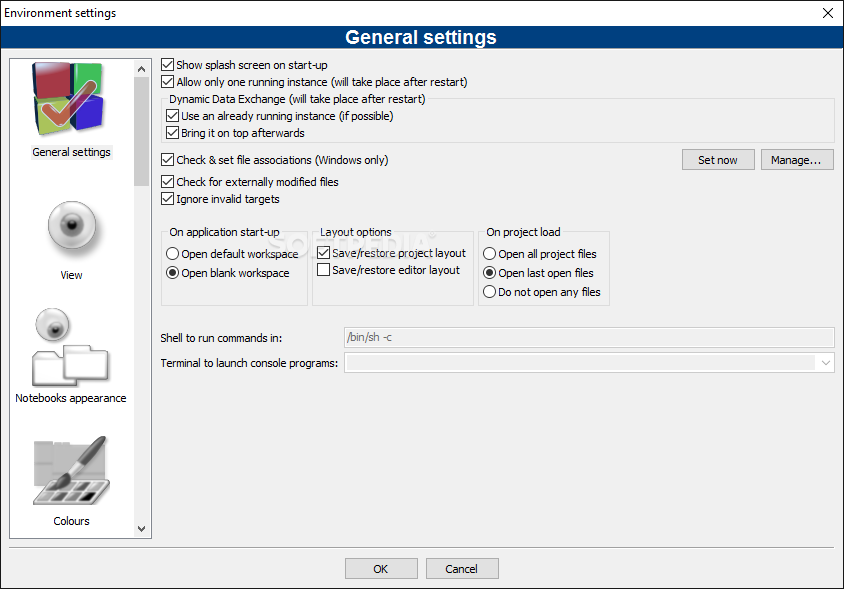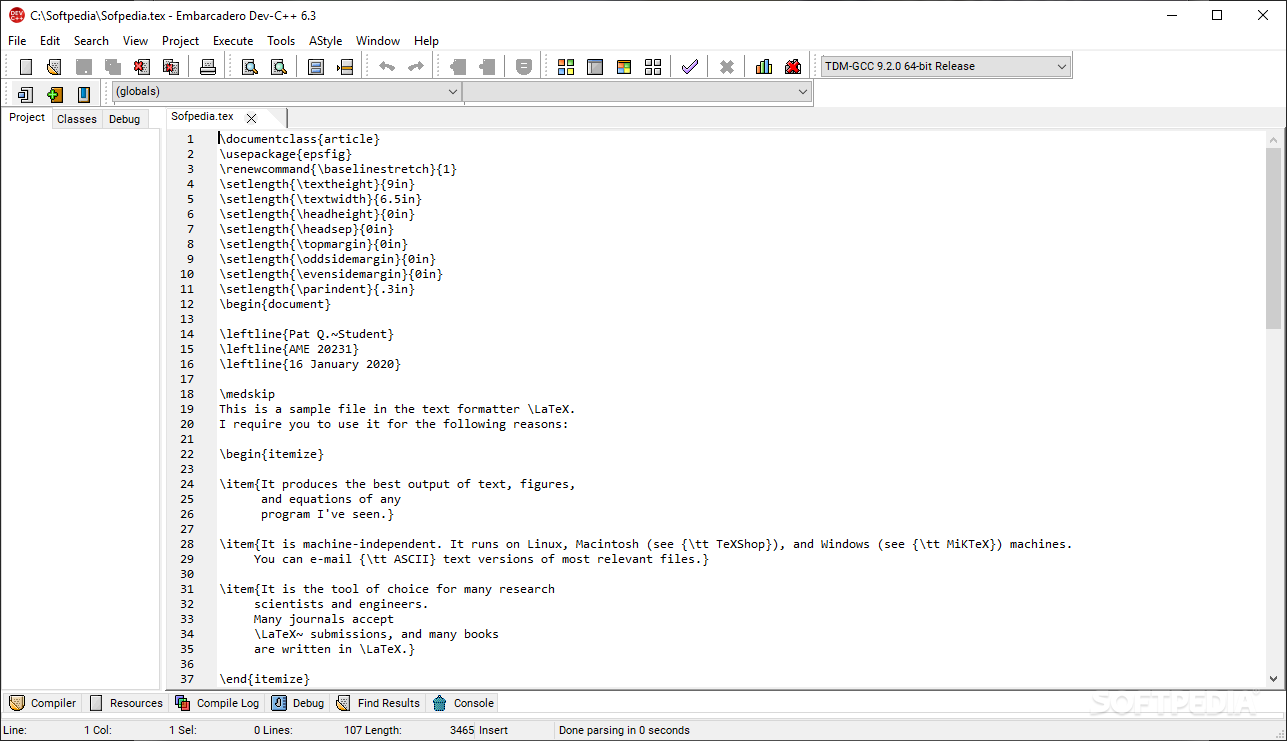Dev C++ Linux Download
Latest Version:
DEV-C++ 5.11 LATEST
Requirements:
Windows XP / Vista / Windows 7 / Windows 8 / Windows 10
Author / Product:
Bloodshed Software / DEV-C++
Old Versions:
Filename:
Dev-Cpp 5.11 TDM-GCC 4.9.2 Setup.exe
MD5 Checksum:
581d2ec5eff634a610705d01ec6da553
Details:
DEV-C++ 2020 full offline installer setup for PC 32bit/64bit
Download boot camp 6 mac. Jun 02, 2019 Contribute to torvalds/linux development by creating an account on GitHub. Linux kernel source tree. Contribute to torvalds/linux development by creating an account on GitHub. Torvalds / linux. Watch 6.9k Star 88.6k Fork 30.9k Code. Boot camp mac mini. Pull requests 326. Actions Projects 0. Security Insights Code. Pull requests 326. Dev-C is a full-featured Integrated Development Environment (IDE) for the C/C programming language. It uses Mingw port of GCC (GNU Compiler Collection) as its compiler. Oct 30, 2018 Its is a featured-packed IDE i-e Integrated development environment which is designed by Bloodshed Software to create and debug apps that are based know on one of the most popular programming language known as C. Although, there are many other upgraded C development tools that have been introduced in the virtual market over the years numerous users around the globe still prefer to use Dev. Installing and Using Dev C and Allegro Game Library. This page describes how to install both the Dev C Integrated Development Environment (IDE) and the Allegro Game Library.CISP 360 students will only need to follow the directions to install the Dev C IDE.
integrated development environment (IDE)Dev-C 4 Dev-C is a full-featured integrated development environment (IDE), which is able to create Windows or console-based C/C programs using the Mingw compiler system (version MSVCRT 2.95.2-1 included with this package), or the Cygwin compiler.
for creating, debugging and creating applications written in a popular C++ programming language. Even though tools for the development of C++ software have undergone countless upgrades over the years, a large number of developers located all around the world have expressed a wish to continue using DEV-C++. This IDE platform has proven itself as highly reliable and intuitive, giving developers access to all of their necessary tools, in-depth debugging, and most importantly, a stable error-free environment for the development of apps of all sizes – from small school tasks to large business projects intended for both internal and public use.The app is an open-source IDE environment, offering software solutions and the necessary tools for C++ app development. However, be aware that its toolset is focused more on novices and basic programming, and that open source community has not updated its toolset for a considerable time. Still, what is present in its latest version represents a highly-capable C++ IDE that could be used for years without encountering any issue.
If you are a novice, are a student who wants to create C++ project in a stable and easy to use software environment, or even if you are a seasoned programmer who wants to access C++ programming inside small IDE that will not strain your computer resources, DEV-C++ represents a perfect choice. It has all the required tools and feature sets for creating small to mid-sized apps.
It runs on all modern versions of Windows and can be used without any restrictions for free. It was originally developed as an open-source fork of the Bloodshed Dev-C++ IDE.
Installation and Use
Even though DEV-C++ is filled with advanced compiler, debugger and a wide array of dev tools, it’s installation package is quite small (only around 50 MB) and therefore can be easily installed on any modern Windows PC or laptop. Just follow the onscreen instructions, and in mere seconds DEV C plus plus will be ready for running. Other more developed modern IDE environments, on the other hand, require much more storage space, and their installation can run for minutes.
Once up and running, you will be welcomed in a user-friendly interface that can be additionally customized to better fit your needs. The main window of the app follows the basic structure of many other modern IDE environments, with top row of dropdown menus and buttons that are shortcuts to its many built-in tools, a large vertical three-tabbed area for managing Projects, Classes and Debug listings, and of course, the main project area (with support for tabs) where you can start programming your apps. Both the app and the current project can be customized extensively. App Options window features tabs for Genera, Fonts, Colors, Code Insertion, Class Browsing, and Autosave customizations. Environment Options feature tabs for General, Directories, External Programs, File Associations, and CVS support customization.
Features and Highlights
- Fully-featured IDE for developing C++ apps.
- User-friendly interface with many tools for managing project development.
- Resource-light and unobtrusive feature set.
- Focused on novices and mid-level programmers who want stability and reliability.
- Powerful compiler and debugger.
- Compatible with all the modern versions of Windows OS

Linux projects are supported in Visual Studio 2017 and later.
You can use the Visual Studio IDE on Windows to create, edit and debug C++ projects that execute on a remote Linux system, virtual machine, or the Windows Subsystem for Linux.
You can work on your existing code base that uses CMake without having to convert it to a Visual Studio project. If your code base is cross-platform, you can target both Windows and Linux from within Visual Studio. For example, you can edit, build, and debug your code on Windows using Visual Studio, then quickly retarget the project for Linux to build and debug in a Linux environment. Linux header files are automatically copied to your local machine, where Visual Studio uses them to provide full IntelliSense support (Statement Completion, Go to Definition, and so on).
For any of these scenarios, the Linux development with C++ workload is required.
Visual Studio setup
Type 'Visual Studio Installer' in the Windows search box:
Look for the installer under the Apps results and double-click it. When the installer opens, choose Modify, and then click on the Workloads tab. Scroll down to Other toolsets and select the Linux development with C++ workload.
If you are targeting IoT or embedded platforms, go to the Installation details pane on the right. Under Linux development with C++, expand Optional Components, and choose the components you need. CMake support for Linux is selected by default.
Click Modify to continue with the installation.
Options for creating a Linux environment
If you don't already have a Linux machine, you can create a Linux Virtual Machine on Azure. For more information, see Quickstart: Create a Linux virtual machine in the Azure portal.
On Windows 10, you can install and target your favorite Linux distro on the Windows Subsystem for Linux (WSL). For more information, see Windows Subsystem for Linux Installation Guide for Windows 10. If you're unable to access the Windows Store, you can manually download the WSL distro packages. WSL is a convenient console environment, but is not recommended for graphical applications.
Linux projects in Visual Studio require the following dependencies to be installed on your remote Linux system or WSL:
- A compiler - Visual Studio 2019 has out-of-the-box support for GCC and Clang.
- gdb - Visual Studio automatically launches gdb on the Linux system, and uses the front-end of the Visual Studio debugger to provide a full-fidelity debugging experience on Linux.
- rsync and zip - the inclusion of rsync and zip allows Visual Studio to extract header files from your Linux system to the Windows filesystem for use by IntelliSense.
- make
- openssh-server (remote Linux systems only) - Visual Studio connects to remote Linux systems over a secure SSH connection.
- CMake (CMake projects only) - You can install Microsoft's statically linked CMake binaries for Linux.
- ninja-build (CMake projects only)- Ninja is the default generator for Linux and WSL configurations in Visual Studio 2019 version 16.6 or later.
The following commands assume you are using g++ instead of clang.
Linux projects in Visual Studio require the following dependencies to be installed on your remote Linux system or WSL:
- gcc - Visual Studio 2017 has out-of-the-box support for GCC.
- gdb - Visual Studio automatically launches gdb on the Linux system and uses the front-end of the Visual Studio debugger to provide a full-fidelity debugging experience on Linux.
- rsync and zip - the inclusion of rsync and zip allows Visual Studio to extract header files from your Linux system to the Windows filesystem to use for IntelliSense.
- make
- openssh-server - Visual Studio connects to remote Linux systems over a secure SSH connection.
- CMake (CMake projects only) - You can install Microsoft's statically linked CMake binaries for Linux.
Linux setup: Ubuntu on WSL
When you are targeting WSL, there is no need to add a remote connection or configure SSH in order to build and debug. zip and rsync are required for automatic syncing of Linux headers with Visual Studio for Intellisense support. If the required applications are not already present, you can install them as follows. ninja-build is only required for CMake projects.
Ubuntu on remote Linux systems

The target Linux system must have openssh-server, g++, gdb, ninja-build (CMake projects only), and make installed, and the ssh daemon must be running. zip and rsync are required for automatic syncing of remote headers with your local machine for Intellisense support. If these applications are not already present, you can install them as follows:
At a shell prompt on your Linux computer, run:
You may be prompted for your root password due to the sudo command. If so, enter it and continue. Once complete, the required services and tools are installed.
Ensure the ssh service is running on your Linux computer by running:
This starts the service and runs it in the background, ready to accept connections.
Dev C++ Download For Mac
Fedora on WSL
Fedora uses the dnf package installer. To download g++, gdb, make, rsync, ninja-build, and zip, run:
Dev C++ Para Linux Ubuntu Download
zip and rsync are required for automatic syncing of Linux headers with Visual Studio for Intellisense support. ninja-build is only required for CMake projects.
Fedora on remote Linux systems
The target machine running Fedora uses the dnf package installer. To download openssh-server, g++, gdb, make, ninja-build, rsync, and zip, and restart the ssh daemon, follow these instructions. ninja-build is only required for CMake projects.
At a shell prompt on your Linux computer, run:
You may be prompted for your root password due to the sudo command. If so, enter it and continue. Once complete, the required services and tools are installed.
Ensure the ssh service is running on your Linux computer by running:
This starts the service and runs it in the background, ready to accept connections.
Support for Linux C++ development is available in Visual Studio 2017 and later.
Next Steps
You are now ready to create or open a Linux project and configure it to run on the target system. For more information, see: